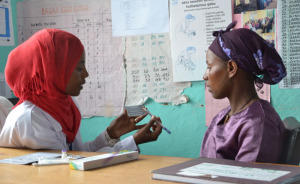
Image courtesy of Pathfinder International
The London Summit on Family Planning in 2012 was the start of a new focus on family planning (FP). The last time FP had received so much attention was the Cairo conference in 1994.
Several factors had turned attention away from FP. The HIV/AIDS epidemic received a huge amount of attention and funding. Donor fatigue was another factor, since FP programs are expensive and the results can be difficult to measure. Perhaps abuse was the most important reason that people lost interest in FP programs. For instance, it became clear that people in many countries, including our own, had been sterilized without informed consent.
Long ago I assisted with infertility surgery on a woman who had had 3 cesareans in Texas and was unable to conceive a fourth child. We found that her Fallopian tubes had been surgically interrupted without her knowledge or consent. Apparently her doctor in Texas didn’t think she should have any more children and had tied her tubes.
The darkest chapter in the history of FP was eugenics, the practice of trying to improve human genetics. In some cases eugenicists mandated sterilization of “undesirable†people—people of color, people with birth defects or learning disabilities, and people with mental problems. Often the eugenics movement was allied with political goals; the enemies were labeled as “undesirablesâ€. My personal experience is that some of my favorite patients might have fallen into an “undesirable†category.
A number of women in California prisons were sterilized without following proper legal procedure—and probably without respect for the women’s human and reproductive rights. There are also stories of widespread abuse from India and Peru among other countries. It is unforgivable that people have been taken advantage of, but that is no reason to halt all FP programs.
Last month I wrote about the women who died in India after tubal ligation surgery. The press has focused on the terrible conditions where the surgery was performed. Also disturbing is how the women were treated before the surgery—they were not given a choice of temporary contraceptive methods nor told about the risks of the surgery.
225 million women worldwide want to avoid pregnancy but don’t have access to modern contraception. How can services to these people be delivered without abuse?
The goal of the London Summit is monumental, but attainable: to reach 120 million new users of FP by the year 2020. This effort is nicknamed FP2020. The memory of past abuses triggered concerns that such an ambitious goal could lead to new abuses. One of the first steps FP2020 took was to consult social scientists about ways to decrease the chances of coercion. In their report they asked: “How can we ensure public health programs oriented toward increasing voluntary family planning… respect, protect and fulfill rights in the way they are designed, implemented, and evaluated?â€
In response they developed an innovative plan. Instead of focusing on getting people to adopt FP, they recommend working from a basis of human rights. That is correct: family planning should be based on human rights.
Although this seemed revolutionary to me at first, I realized that a major reason I became interested in FP is to further human rights. On the individual scale the lives of parents are improved if they have the right to choose how large their family will be. Of course their children benefit, too! On a global scale people’s rights may be trammeled as population density increases.
The authors of the report define reproductive rights as reproductive self-determination; access to reproductive health services, supplies and information; and nondiscrimination. Self-determination is the key—people must be able to choose what method of family planning (if any) they use. Both information and supplies need to be readily available for this to succeed. In most of the world, including the USA, lower-income folks are less able to access FP, but this discrimination must stop.
How can policies be made so rights are more important than quotas? Standards will be made and enforced to deliver quality care. Supplies are often a problem in developing countries, but that problem can be solved with technology. Production should be judged not by the numbers of patients served but by how well they are served. For instance, clients can be given questionnaires before they leave a clinic to be sure that they were given information about all available FP methods.
So far, this is theoretical; it remains to be seen if reproductive and human rights can be honored consistently. Next month I’ll report on FP2020 in action.
© Richard Grossman MD, 2015